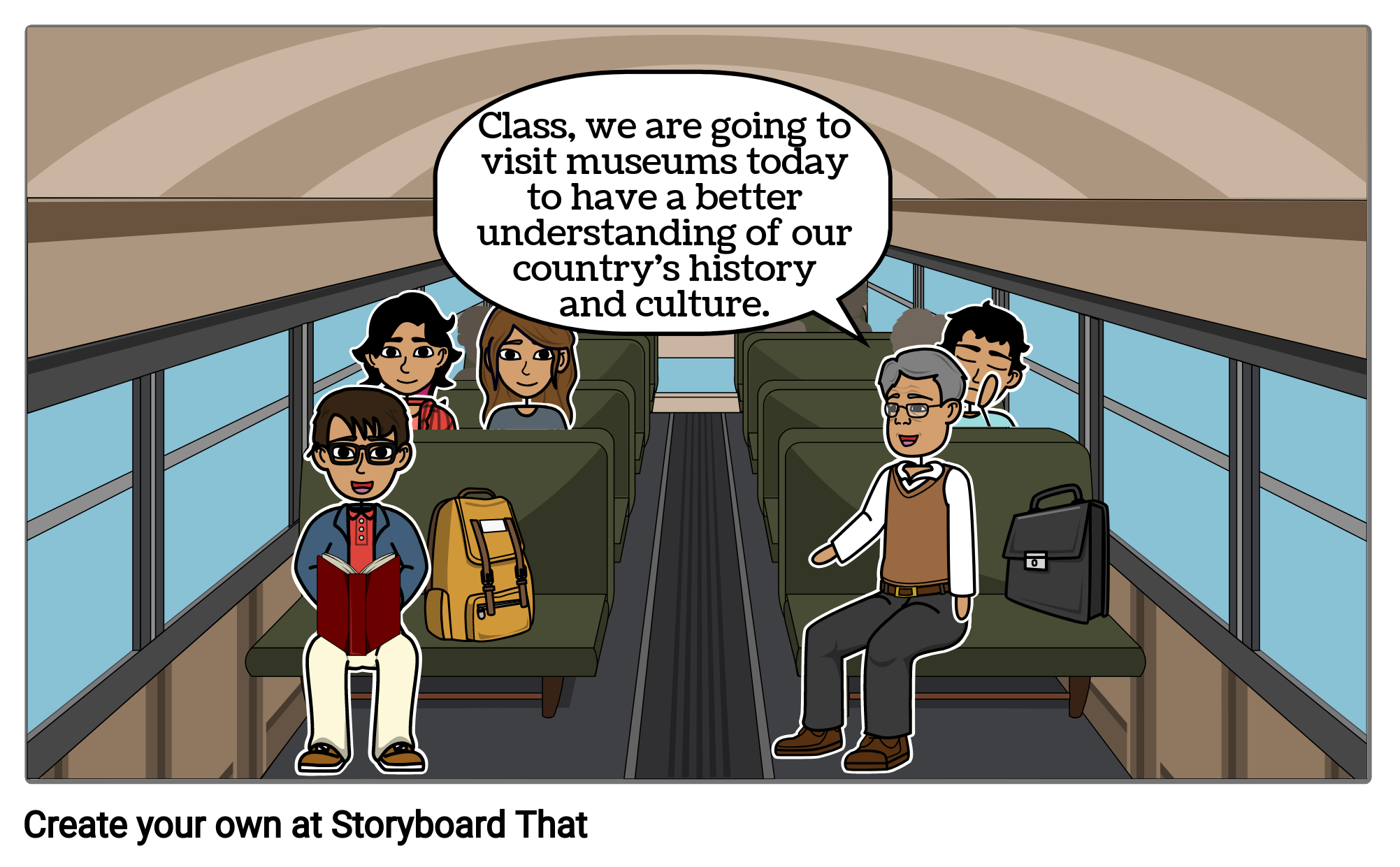LESSON GOAL
Let’s check our lesson goal.
In this material, you will learn the words and phrases that are used when talking about history and culture and express your opinions about specific topics.
In this material, you will learn the words and phrases that are used when talking about history and culture and express your opinions about specific topics.
この教材では、歴史や文化に関連した語彙や表現を学び、特定の話題について意見を述べる練習をします。
PART A_1
Please study the picture below. Then, describe it in as much detail as you can.
PART A_2

| Answer: | |
| . |
PART A_3
Now, let me ask you a question about the picture.
PART A_4
| 1. | Who is the professor talking to? |
| Answer: |
PART A_5
Now, let us review your answers.
(Please review your student’s answers by sending the correct answers in complete sentences. After that, ask your student to read aloud his or her corrected answers.)
PART A_6
Choose the correct meaning of the underlined word in each sentence.
PART A_7
| 1. | People can enjoy many cultural attractions in our country. |
| a. | [adjective] relating to habits, traditions, and beliefs of a society |
| b. | [noun] the feeling of being certain that something exists or is true |
| c. | [noun] the study of history and how it is written |
| 2. | We are studying the Roman civilization. |
| a. | [noun] a human society with developed culture and laws at a specific time and place |
| b. | [noun] an object that was created a very long time ago |
| c. | [noun] a written record of historical events |
| 3. | He is famous for his successful expeditions. |
| a. | [noun] the process of teaching or learning in a school |
| b. | [noun] a particular system of beliefs and values |
| c. | [noun] an organized journey, especially a long one for a particular purpose |
| 4. | I have been studying the origin of the English language. |
| a. | [adjective] ridiculous or completely unreasonable |
| b. | [noun] point where something begins or comes from |
| c. | [noun] the traditional stories and culture of a group of people |
| 5. | The American Revolution is one of the most remarkable revolutions. |
| a. | [verb] to try to develop and improve something |
| b. | [adjective] existing as an idea, feeling, or quality |
| c. | [adjective] someone or something amazing and unforgettable |
PART A_8
Now, let us review your answers.
(Please review your student’s answers by sending the correct answers in complete sentences. After that, ask your student to read aloud his or her corrected answers.)
PART B_1
Please construct your own sentences using the following words.
PART B_2
| 1. | expedition | Answer: | . | |
| 2. | remarkable | Answer: | . | |
| 3. | civilization | Answer: | . | |
| 4. | cultural | Answer: | . | |
| 5. | origin | Answer: | . |
PART B_3
Now, let us review your answers.
(Please review your student’s answers by sending the correct answers in complete sentences. After that, ask your student to read aloud his or her corrected answers.)
PART C_1
Please complete each sentence by choosing the correct answer in the box below.
PART C_2
| origin | remarkable | expedition |
| cultural | revolution | civilization |
| 1. | They were able to manage the scientific ____________ successfully. |
| 2. | There are still some ____________ unknown to man. |
| 3. | There are a lot of ____________ events over the past decades. |
| 4. | Mesopotamia is one of the oldest ____________. |
| 5. | We noticed a lot of ____________ differences when we visited other countries. |
PART C_3
Now, let us review your answers.
(Please review your student’s answers by sending the correct answers in complete sentences. After that, ask your student to read aloud his or her corrected answers.)
PART D_1
Let’s talk. Please answer the questions by stating your opinions.
PART D_2
| 1. | Some people say that culture is important to society. What do you think about that? |
| Answer: | |
| 2. | History helps us understand the present. Do you agree or disagree? |
| Answer: |
PART E_1
Now, I will ask you the following questions. You may ask questions, too.
PART E_2
| 1. | Is history important for you? Why or why not? |
| Answer: | |
| 2. | What is your favorite Japanese culture? |
| Answer: | |
| 3. | What do you think is interesting about your culture? |
| Answer: | |
| 4. | Do you think history repeats itself? |
| Answer: | |
| 5. | What period of history interests you most? |
| Answer: | |
| 6. | How is your culture unique from others? |
| Answer: | |
| 7. | If you could change one thing about your culture, what would it be? |
| Answer: |
REVIEW AND FEEDBACK
Now, let us review the things that you learned in this lesson.
ではこのレッスンで学んだことを振り返りましょう。
(Please give a short feedback on how your student did on your class.)
| Grammar 文法 |
Pronunciation 発音 | Vocabulary 単語 |
Comprehension 理解 |
|
|---|---|---|---|---|
 GOOD GOOD |
文法の誤りはほとんどなく、完全な文章で話すことができる | ほとんどの単語をはっきりと正しく発音することができる | 習った表現を適切に使うことができる | 文章を理解し、質問に正しく答えることができる |
 FAIR |
文法の誤りはあるが、完全な文章で話すことができる | 発音の練習が必要な言葉がいくつかある | たまにミスはあるが、習った表現を適切に使うことができる | 文章を完全に理解するのは難しく、質問に正しく答えられないときもある |
 POOR |
文章で話すのは難しく、単語だけで話すことができる | 発音の練習が必要である | 習った単語と表現を少しだけ使うことができる | 文章を理解するのは難しく、質問に答えるのは難しい |
レッスン教材に関するアンケートのお願い
レッスン教材の改善・拡充を図ることを目的とし、アンケートを実施しております。
以下のURLからアンケートにお答えいただき、 ご意見・ご要望をお聞かせください。
アンケートはこちら